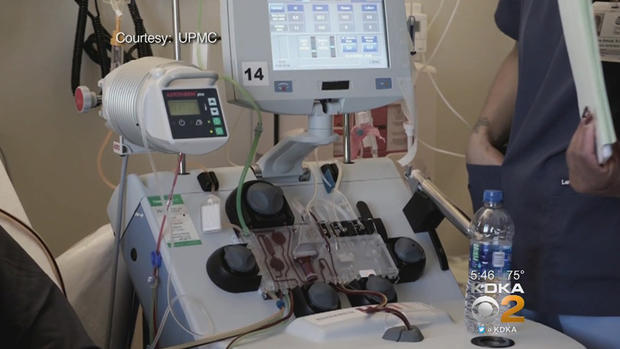New CAR-T Treatment Giving Hope To Some Cancer Patients
Follow KDKA-TV: Facebook | Twitter
PITTSBURGH (KDKA) -- Shari Kienzle was just back from vacation when she noticed something wasn't right.
"I just felt very tired, very weak. And my back was really hurting me," she describes.
She thought she had the flu, but it turned out to be a blood cancer called Diffuse Large B Cell Lymphoma, a type of non-Hodgkins lymphoma, where the cancer comes from white blood cells.
"I started getting sicker and sicker, and more people were sending cards, and saying, 'Oh, you're going to beat this,' and I was like, 'Wow, this must be...' it took a while to sink in that it was really bad or serious," she recalls.
She got the customary multi-drug chemotherapy treatment but the aggressive disease raged on.
"My body was shutting down. I was very weak. Hard to get up and walk around," she says.
"Particularly those patients who don't respond to therapy the cure rate becomes exceedingly small," says UPMC cancer specialist Dr. Joseph Rossetti. "Cancer cells, unfortunately, do develop mechanisms by which they evade the immune system."
For these people, a new approach has come along, just FDA-approved about a year ago, called CAR-T.
"He just said it's really going to be a great option for us," Shari says. "He didn't say we're running out of options, which we really were."
It stands for Chimeric Antigen Repector T cell therapy.
First, blood is collected from the patient, and the T cells are extracted. These are sent to a lab and a special protein is added. The T cells come back and as a one-time intravenous infusion, they are given back to the patient, but these cells are now equipped to fight and kill the cancer.
Since this approach is reserved for people who don't respond to chemo, no one knows if this works better.
But for people who participated in the earliest trials, some of them are still doing well five years after treatment.
"One of the exciting things about CAR-T cells is that they can potentially live for a sort of indefinite amount of time and continue to perform surveillance," explains Dr. Rosetti. "I think the big question is how long is this going to last? Nobody knows, but so far, the data is exceedingly encouraging."
There are serious side effects with CAR-T. And there have been a few deaths.
"Often times seen with high fevers, there can be changes with the blood pressure," says Dr. Rossetti.
Shari had all of them, including brain swelling. She was in a coma for days. It frightened her family.
"They didn't know how long it was going to last," Shari says. "They were expecting me to turn around and joke, or say something to them, and I couldn't even talk to them."
CAR-T is not available everywhere. The staff requires extensive training and certification. UPMC has given 25 patients CAR-T, mostly as part of a clinical trial.
For the appropriate patients, with extensive screening and pre-testing, insurance coverage hasn't been a problem.
Shari's scans look dramatically different after treatment.
"My husband and I were waiting in the treatment center, when they came up and said that you're not going to believe this," Shari says.
"Her latest scans are completely clean, no evidence of cancer whatsoever," says Dr. Rosetti. "And to see the joy and smile on her face, it's humbling that these more recent visits are not spent talking about our next step to eradicate her cancer, but to talk about her kids, to talk about what she's doing over the weekend. It's humbling."
Shari says she has received a miracle.
"Nothing's working, nothing's working, nothing's working. I just expected to hear, it didn't work. And then all of a sudden you hear, it worked, and you're like, 'Oh my! What's next?'" says Shari. "Last week, my husband and I went on a mile walk. I feel like Wonder Woman now, compared to what I had been through."




